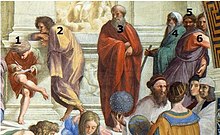
Back شكوكية أكاديمية Arabic Nova escola atenenca Catalan Escepticismo académico Spanish شکگرایی آکادمیک Persian Akateeminen skeptisismi Finnish Nouvelle Académie French 아카데메이아 회의주의 Korean آکادمیک شکاکون MZN د شکیانو ښوونځې Pashto/Pushto Ceticismo acadêmico Portuguese

Academic skepticism refers to the skeptical period of the Academy dating from around 266 BCE, when Arcesilaus became scholarch, until around 90 BCE, when Antiochus of Ascalon rejected skepticism, although individual philosophers, such as Favorinus and his teacher Plutarch, continued to defend skepticism after this date. Unlike the existing school of skepticism, the Pyrrhonists, they maintained that knowledge of things is impossible. Ideas or notions are never true; nevertheless, there are degrees of plausibility, and hence degrees of belief, which allow one to act. The school was characterized by its attacks on the Stoics, particularly their dogma that convincing impressions led to true knowledge. The most important Academics were Arcesilaus, Carneades, and Philo of Larissa. The most extensive ancient source of information about Academic skepticism is Academica, written by the Academic skeptic philosopher Cicero.
© MMXXIII Rich X Search. We shall prevail. All rights reserved. Rich X Search